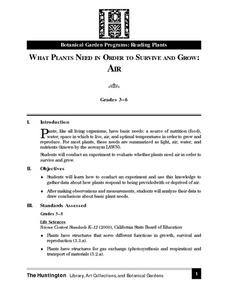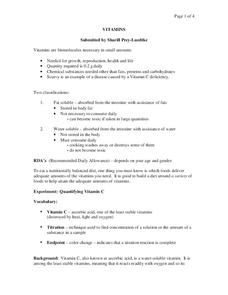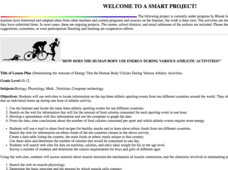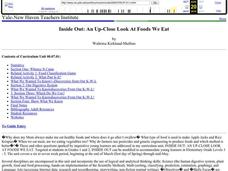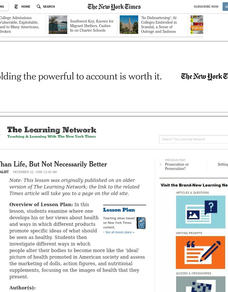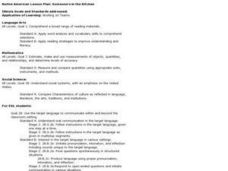Curated OER
Food Classification
Students are introduced to classification and some of the difficulties surrounding classification and how classification systems need to be able to adapt and how they may need to be changed when new information is discovered. They...
Curated OER
What Plants Need in Order to Survive and Grow: Air
Young scholars conduct an experiment to determine whether plants need air in order to survive and grow. They discuss natural resources, analyze slides, and observe and record data from the experiment.
Curated OER
Trophic Ecology of Humans
students analyze the place of humans among the tropic levels by observing what we eat. They calculate the caloric content of several foods commonly eaten by humans and calculate the total energy cost to grow, process, transport, store...
Curated OER
Trophic Ecology of Humans
Students analyze the trophic level of humans by first calculating the kilocalories in own their lunch. They then calulate the kilocalories in a wide variety of foods found in grocery stores and compare the kilocalories needed to acquire...
Curated OER
Vitamins
Young scholars determine the amount of vitamin C present in 3 samples of juice stored in various light conditions. In this vitamin lesson plan, students investigate the amount of vitamin C present in juice exposed to different quantities...
Curated OER
Measuring Calories in Food
Students measure the amount of calories in food. In this food energy lesson, students discuss what a calorie is, how our bodies use a calorie, and how many we need. Then, students use a calorimeter to calculate the amount of energy in a...
Curated OER
Sunlight and Warm Air
Students examine the different ways heat can be felt. In this radiation and conduction lesson plan, students recognize that the sun radiates heat. Students conduct three experiments to find how the sun warms the Earth and how that heat...
Curated OER
Frozen, Canned or Fresh?
Learners compare spinach. In this Science lesson, students construct an experiment to test fresh, frozen, and canned spinach taste and texture. Learners record their findings in charts and graphs.
Curated OER
Food for Thought
Fifth graders explore the brain and what is needs. In this biology lesson plan, 5th graders will work on a series of activities that will allow them to learn about the brain, its parts, and the best foods to eat for their brain.
Curated OER
Candy Bar Fractions
Learners explore the relationship between caloric expenditure and exercise, and see a real world use for fractions as they relate to daily life.
Curated OER
Fast Food Fun
Students use technology to input, retrieve, organize, manipulate, evaluate, and communicate information to find calories and fat in a typical fast food meal. They decide which fast food restaurant you would like to visit and click on...
Curated OER
Fish Activities
In this fish activity worksheet, students learn a counting rhyme about fish. They then discuss the best way to care for fish and they learn 4 different types of fish. On the second page, students count lines of fish and color them a...
University of Rhode Island
How Does the Human Body Use Energy during Various Athletic Activities?
Students investigate how much energy is used during different athletic activities. They conduct Internet research to obtain information on the top three athletic sporting events from around the world, and calculate the calories burned...
Curated OER
Ecology and the Conservation of Natural Resources Lesson 2
Young scholars compare and contrast abiotic and biotic factors. They discuss how these factors effect ecosystems. They answer questions to complete the lesson.
Curated OER
The Dentist
Students read a short story about visiting a dentist. Then they use toothbrushes in order to demonstrate the correct way to brush teeth. Students use the internet to investigate how some foods are healthier for teeth than others. Then...
Curated OER
Learning From Leaves: A Look at Leaf Size
Students measure and analyze leaves from various environments. They discuss the environments, and make inferences about environmental variables that could have contributed to the differences in leaf size and texture.
Curated OER
My Personal Improvement Plan
Students investigate what is necessary to design a personal improvement plan including making web using software. They research the meaning of Body Mass Index and how to measure it before accessing assigned web sites that discuss health...
Curated OER
Optimization For Breakfast
Students identify he proportion of a cereal box. In this algebra lesson, students define the relationship between patterns, functions and relations. They model their understanding using the cereal box.
Curated OER
Inside Out: An Up-Close Look At Foods We Eat
Fourth graders identify the origins of meats and vegetables consumed by humans on a daily basis. They classify foods (meats, dairy products, grains...) and create a food pyramid.
Curated OER
Bigger Than Life, But Not Necessarily Better
Students evaluate images of health in American society, then students examine where one develops his or her views about health.
Curated OER
Food Web Mystery
Students describe typical marine food webs, and explain why food is generally scarce in the deep-ocean environment. They discuss reasons that seamounts may support a higher density of biological organisms than would appear to be possible.
Curated OER
Learning From Leaves: Adaptations To Differing Light Levels
Students, in groups, examine plants with different light levels. They are given plants from a tropical and desert region. They write a hypothesis at the beginning of the experiment.
Curated OER
Identifying Implications
Students read a variety of reading passages and articles. They investigate how to make implications and assumptions using the information provided.
Curated OER
Native American Lesson Plan: Someone's in the Kitchen
Young scholars use vocabulary necessary to complete cooking activities and tell others about the food. They discuss similarities and differences between Native American and other nationalities' foods made in their families.



